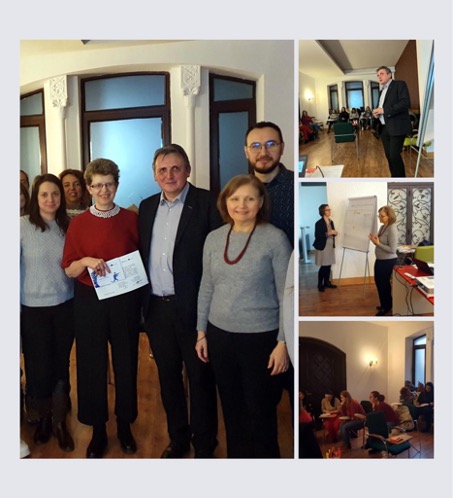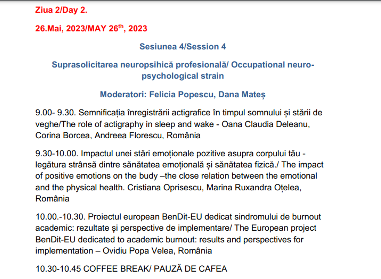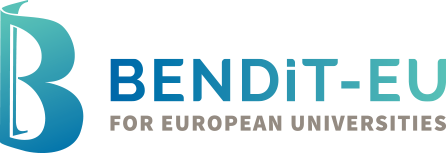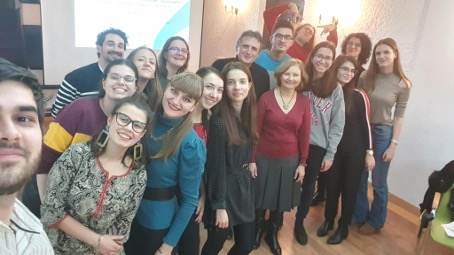1. The workshop The burnout syndrome in the medical domain: prevalence, prevention, diagnosis, intervention
On the 8th of February 2023, The Medical Psychology Department, in collaboration with the Epidemiology I Department, organized a 5-hour workshop about burnout in the medical field called The burnout syndrome in the medical domain: prevalence, prevention, diagnosis, intervention in the Centre of Innovation and e-Health of “Carol Davila” University of Medicine and Pharmacy, Bucharest, Romania. The workshop targeted residents specialized in Epidemiology and Public Health and Management. This workshop was a continuation of the workshop for Medical students. During this event, information about the results of the BENDiT-EU project was locally disseminated by the research team of the BENDiT-EU project, Liliana Diaconescu, Alexandra Mihăilescu and Ovidiu Popa-Velea. As such, residents became familiar with the Burnout Manual (IO1), the Burnout Web Platform (IO2), and the importance of implementing a Curriculum dedicated to burnout (IO3).

2. The workshop The Academic Burnout Syndrome: diagnosis, risks, solutions
A 2-hour Medical Education activity about academic burnout, named The Academic Burnout Syndrome: diagnosis, risks, solutions, took place on the 17th of March 2023 during the event called The Medical Education Days (ZEM), organized by SSMB- The Society of Medical Students from Bucharest, Romania. During this symposium, relevant theoretical concepts of academic burnout were presented, as well as standardized instruments for the diagnosis and screening for burnout in the academic context. A special attention was given to the main prevention and intervention methods dedicated to Medical and allied health domains. The topics focused on the results of the Erasmus+ project BENDiT-EU, namely, the Burnout Manual and the Burnout Web Platform (BWP). The BENDiT-EU research team, Liliana Diaconescu and Ovidiu Popa-Velea mentioned that the Burnout Web Platform is a very useful resource in the screening for the burnout syndrome, in providing local information about how to get free support, in offering answers to frequently asked questions about burnout and academic burnout and suggesting practical self-help in distress solutions for Medical and allied-health students.
3. From academic burnout to physicians’ burnout: an unavoidable transition?
Date: May 5th, 2023
Event: The Burnout Symposium organized by the Romanian Academy of Medical Sciences
12 keynote speakers in 3 distinct sections
Online https://www.youtube.com/watch?v=Bou3rz36plo
Language: Romanian
Presenter
Assoc Prof Dr Ovidiu Popa-Velea
From academic burnout to physicians’ burnout: an unavoidable transition?
Included in the session: What information do we have in this moment?
Description:
- The presentation displayed the importance of the early prevention of physicians’ burnout, via prevention of academic burnout.
- Data from literature where presented and discussed.
- In a distinct part of the presentation, the practical usefulness of the BENDiT-EU project was commented. A specific attention was allocated to the 4 intellectual outputs (IOs) of the project, in terms of their implementation at:
- the individual level of prevention (IO1, IO3: knowledge of the burnout syndrome; IO1: facilitating the call to community resources for managing academic stress, IO2: transversal and dynamic self-evaluation);
- the individual level of intervention (IO1, IO2, IO3 – for the benefit of University Counselling Centres, tutors, mentors, psychotherapists in private practice);
- the micro-pedagogical-formative collective level (optional course or extracurricular workshop curriculum);
- the macro collective level – university policies (IO4 – curriculum flexibility, more nuanced/ personalized assessment, implementation of more effective support systems for students)
4. The European BENDiT-EU project dedicated to the academic burnout syndrome: results and perspectives
Date: May 25th, 2023
Event: The 21st Congress of the Romanian Society of Occupational Medicine, Sinaia, Romania
Presenter:
Assoc Prof Dr Ovidiu Popa-Velea
Department of Medical Psychology, Faculty of Medicine, Carol Davila University of Medicine and Pharmacy– Bucharest, Romania
Audience:
60 persons, mostly Occupational Medicine specialists
Key points:
- In recent decades the prevalence of the burnout syndrome among workers in the medical environment has steadily increased.
- Its primary prevention, as well as the outline of a functional case management system of burnout, represent stringent requirements.
- Developing awareness about the risks of burnout in medical academic contexts, as well as effective coping strategies, can have positive long-term consequences both at the individual and organizational levels.
- The European project BENDiT-EU, coordinated by the UMF Carol Davila – Bucharest, aimed to prepare a comprehensive set of resources for the prevention and management of burnout in universities of Medicine.
- Partners in the project: the National Institute of Health Services Management
(INMSS) from Bucharest; University of Nicosia, Cyprus; University of Murcia, Spain;
Lusofona University, Portugal; Trakia University, Stara Zagora, Bulgaria and VITECO, Italy.
- Target groups: students in Medicine and in health-related fields from the partner countries, the support staff working in the five universities within the BENDiT-EU project, and the representatives of governing bodies, responsible for developing policies at the university level.
- Products realized:
- Burnout manual-pocket edition (in English, Spanish, Bulgarian, Greek, Romanian,
Portuguese and Italian): its main objective is to increase the level of awareness of students at
Medicine and from fields related to Medicine regarding academic burnout. It is structured in three chapters (dedicated to diagnosis, prevention, and therapeutic interventions).
- Burnout web platform: provides to users the real-time opportunity to self-assess their level
of burnout, in association with their well-being, depression and resilience. At the same time, it offers information about access to resources offered by local communities, frequently asked questions about burnout and basics about self-management interventions for burnout symptoms.
- The curriculum for students: is structured in two modules lasting 5 days [module 1 –
The concept of academic burnout, assessment and identification (3 days), module 2 – Interventions and resources for academic burnout (2 days)]. In addition to the basic text support, this curriculum contains presentations in Powerpoint, with annotated slides for teachers or trainers.
The Train-the-trainer guide for trainers and support staff: provides basic information on
the way of presenting curriculum information. It also helps the trainers in checking the understanding of the information by the target group.
- Policy suggestions: aimed at identifying good practices (programs) in the prevention of burnout in universities in the world and evaluating their implementation, together with policy makers.
- Evaluation: generally positive or very positive. This stimulates the continuation of efforts at the European level aimed at prevention and therapy of burnout in academic environments.

5. The European BENDiT-EU project dedicated to the academic burnout syndrome: results and perspectives
Date: June 9th, 2023
Event: The 15th Congress of the Romanian Association of Psychiatry and Psychotherapy, Bucharest, Romania
Presenter:
Assoc Prof Dr Ovidiu Popa-Velea
Department of Medical Psychology, Faculty of Medicine, “Carol Davila” University of Medicine and Pharmacy– Bucharest, Romania
Audience:
70 persons, mostly Psychiatry specialists and residents
Key points:
- The prevalence of the burnout syndrome among workers in the medical environment (including psychiatrists) has increased.
- Its primary prevention, as well as the development of a functional case management system for handling burnout, should represent major priorities.
- Students are key actors in delivering good quality care and their mental health should be a concern for decision-makers in the health field.
- The European project BENDiT-EU, coordinated by the UMF Carol Davila – Bucharest, aimed to prepare a comprehensive set of resources for the prevention and management of burnout in universities of Medicine.
- Partners in the project: the National Institute of Health Services Management
(INMSS) from Bucharest; University of Nicosia, Cyprus; University of Murcia, Spain;
Lusofona University, Portugal; Trakia University, Stara Zagora, Bulgaria and VITECO, Italy.
- Target groups: students in Medicine and in health-related fields from the partner countries, the support staff working in the five universities within the BENDiT-EU project, and the representatives of governing bodies, responsible for developing policies at the university level.
- Products realized:
- Burnout manual-pocket edition (in English, Spanish, Bulgarian, Greek, Romanian,
Portuguese and Italian): its main objective is to increase the level of awareness of students at
Medicine and from fields related to Medicine regarding academic burnout. It is structured in three chapters (dedicated to diagnosis, prevention, and therapeutic interventions).
- Burnout web platform: provides to users the real-time opportunity to self-assess their level
of burnout, in association with their well-being, depression and resilience. At the same time, it offers information about access to resources offered by local communities, frequently asked questions about burnout and basics about self-management interventions for burnout symptoms.
- The curriculum for students: is structured in two modules lasting 5 days [module 1 –
The concept of academic burnout, assessment and identification (3 days), module 2 – Interventions and resources for academic burnout (2 days)]. In addition to the basic text support, this curriculum contains presentations in Powerpoint, with annotated slides for teachers or trainers.
The Train-the-trainer guide for trainers and support staff: provides basic information on
the way of presenting curriculum information. It also helps the trainers in checking the understanding of the information by the target group.
- Policy suggestions: aimed at identifying good practices (programs) in the prevention of burnout in universities in the world and evaluating their implementation, together with policy makers.
- Perspectives of implementation are situated at multiple levels (from individual to collective, and from the reparatory to formative ones).











